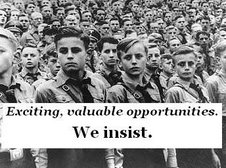Following on from the Karen Mathews trial, Raedwald has posted about the breakdown of society and makes this comment, with which I have little to disagree: I'm not interested in making a moral judgement on the lifestyle of the underclass, or on bastardy, but the economic and social cost to the rest of us is already vast, will get much worse during the recession and is simply unsustainable in the long term. It did make me wonder about the phrase "dignity of work" and whether this really is the case? Do we really value work so highly to the point where it provides dignity? I think not, but I do believe there is/was dignity in providing for our family and when that doesn't need be done there is no reason to work, especially if you are at the bottom end of the social and education ladder. Firstly, when The Sprog was at school he used to complain bitterly when teachers tried to bribe them in to working hard by claiming that if they didn't they would end up as street cleaners or dustbin men. His point was that these jobs are something that we need doing and we should value the work, even if it is not highly paid. He makes a very good point, if those who aren't academically bright and will end up doing these jobs don't see them as worthwhile; they won't be at the front of the queue to do them, unless they feel they have no choice. But the welfare state means they do have a choice. Secondly, I remember the feeling when The Sprog was born and I brought him home from hospital. It was an almost immediate transformation in my approach to life. I had always worked hard but did have a laissez-faire* approach to life but the new responsibility made realise I had to take control and ensure he and The Great WiseOne would be looked after if anything happened to me. I also wanted to ensure I could provide a comfortable life for them, even if it meant personal sacrifices. I know we men aren't supposed to talk about things like this when we are together but when I have discussed it with them they admit to similar feelings. Now, I was brought up to believe that I had to provide for myself and family to the best of my ability by my father who was born and raised in the slums of Bradford, long before the welfare state was created. I remember that this was the approach of most of his friends and all my relations. They all took great pride in looking after their family and ensuring they were provided for, but then they grew up when the had no choice. I remember that they would have been appalled at having to take "handouts" as they saw them to ensure their family fed and most of these were miners, dustbin men and street cleaners. So why don't those like Karen Mathews and her boyfriends have the same desire to provide for their children and seem happy to rely on benefits to provide not only for themselves but also their children? I often think "do they have no pride" and I suppose the answer is no they don't, well not in the same sense that I do. Reading Raedwald's post made me realise that the Welfare State, in its desire to ensure that the poor don't have the hardship of the past, has crushed this desire to provide their family out of them- they don't need to do it and so don't see why they should make sacrifices to provide. This, added to our desire not to be judgemental about lifestyle choices, has meant that they don't have any shame; it doesn't worry them that the rest of us are working to pay for their lifestyle because they have been told that the money they get is an entitlement and anyway, any jobs they can do, like street cleaning or emptying the bins are sneered at as for failures and that doesn't include them Now comes the difficult part, how to change that attitude? I don't have the answers other than reduce benefits to the point where they have no choice but to go out and work, or steal or beg and sadly the latter 2 will probably be the chosen options. The other problem is that we do as a society want to genuinely look after those who have suffered life's outrages slings and arrows of misfortune. *The true (wiki) meaning of the words: "a term used to describe a policy of allowing events to take their own course with minimal intervention."
There is a simple truth that Brown and his party are just too thick to understand, and it's that welfare causes poverty. The most effective measure in tackling poverty is restricting welfare. Clinton's reforms in the US have won for millions the dignity of work and the benison of belonging that the caustic effects of welfare had taken from them.
Tuesday, December 09, 2008
Dignity is in providing, not working
Posted by
Simon Fawthrop
at
Tuesday, December 09, 2008
![]()
Labels: welfare state
Subscribe to:
Post Comments (Atom)











No comments:
Post a Comment